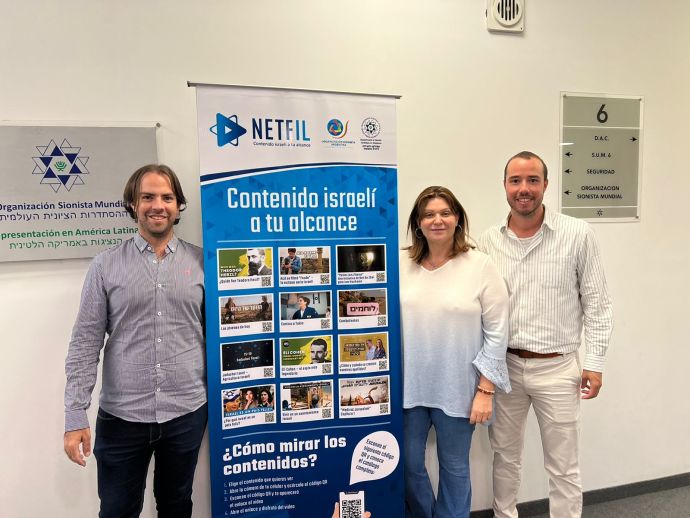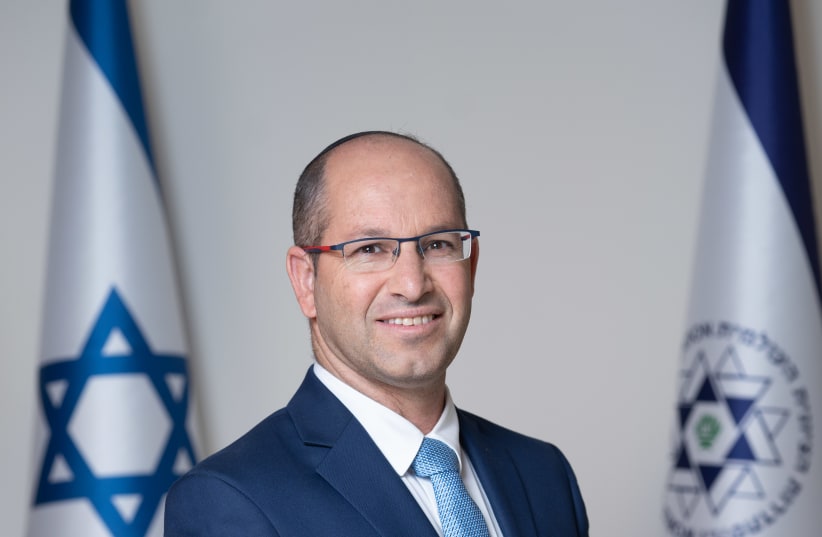Speaking with The Jerusalem Post two days after the elections, Nerya Meir, the youthful head of the Diaspora department of the World Zionist Organization, confronts the elephant in the room with a sense of maturity that is belied by his youthful appearance.
“I understand that there is some concern among certain segments in Israel and the US about the fact that Israel’s political right will be leading the next government,” says the 42-year-old Meir, who has served as a member of the Zionist Executive on behalf of the World Likud Movement since 2015. “But I am happy that this concern has been expressed, because it means that people care about Israel. I would be more worried if people said that they couldn’t care less.”
As the WZO’s representative to Diaspora communities, Meir is sensitive enough to recognize that the leaders of Israel’s next government cannot neglect the interests and wishes of the Jewish community outside of Israel.“I must explain to my colleagues who will be in the Knesset the importance of looking at the big picture,” he says. “We cannot look at the Zionist enterprise and the challenges that are present today exclusively through the prism of the Jewish citizens of Israel. We must have a worldwide Jewish perspective.”

Israel, he explains, belongs to the entire Jewish people, and the dream of the Jewish people must include the Jews of the Diaspora as well. By the same token, adds Meir, the vision of the Jews of the Diaspora must also include Israel. “After their anger subsides,” he adds, “we must reassure them that we are not going to do anything drastic that will negatively affect the Jews of the Diaspora. There are areas of disagreement, but we must find as many bridges as possible.”
In order to maintain a clear and open channel of communication between the incoming Israeli government and Diaspora communities, Meir says that his department will send delegations and missions from the Israeli government to Jewish communities around the world to increase understanding between the different communities.
“I think the political right in Israel has less awareness of the Jewish community in the Diaspora,” he says. “Knowledge is power; the Jews of the Diaspora need to know more about Israel, and Israel needs to know more about the Diaspora. This will lower the barriers and help make connections.”
"Meir recognizes that the leaders of Israel’s next government cannot neglect the interests and wishes of the Jewish community outside Israel"
Meir, who became head of the Diaspora department at the WZO in May 2021, grew up in the Samaria settlement of Ofra, served in the IDF in a special paratrooper unit, is married and is the father of five. He lives in Rehelim, a settlement in Samaria.
“Our main job in the Diaspora department is connecting Jews to Israel,” he explains. “We believe that today, one’s connection with Israel must be a part of Jewish identity.”
The WZO’s Diaspora division is responsible for North America, Latin America, Europe, Australia and South Africa. Meir points out that Diaspora Jewry is not monolithic, and the organization needs to operate differently in different countries and regions. It is no accident that the department staff includes English, French, Spanish and Portuguese speakers. Meir’s philosophy for WZO is already being implemented in his department.
In his view, the common dream among Jews worldwide regarding Israel and Jerusalem no longer exists. “When I look back 200 years,” he says, “we had common dreams. Jews from Yemen and Poland shared a utopian vision of Jerusalem.
After the establishment of the state, the common dream disappeared. Israelis focused on the here and now of Israel, and Diaspora Jewry began focusing more on their own rising challenges like antisemitism, assimilation and Jewish continuity.”
The World Zionist Organization, Meir says, is the tool founded by Theodor Herzl to establish the Jewish state. “We must create a common dream,” says Meir, referring to the Jews of Israel and the Jewish communities in the Diaspora. “We can argue about how the dream will manifest itself, but we must maintain a common dream.”
In that sense, Meir views his task as head of the Diaspora department at WZO to create a shared dream, and take the major ideas of Zionism and make them relevant to Diaspora communities, using modern tools and approaches.
Based on this, Meir and his team opened new programs that meet the various needs of different Jewish communities around the world. “Our two main goals are, one – to stimulate the Zionist discourse so that it is relevant to every Jew, and two – to reconnect leadership and Zionism, as it was in the days of Herzl and the establishment of the state.”
For the first goal, Meir and his department developed programs that use modern tools to make Zionism accessible. For example, they collaborated with KAN II to create a unique application in which young Spanish-speaking Jews can view movies, television series and clips that show them life in Israel at a very high level. The films and materials were translated into Spanish. In this way, Zionism becomes very accessible, reducing the great physical and mental distance.
For the second goal, the Diaspora department has developed several leadership programs that take talented young Jews from all over the world and give them tools from Israeli start-up companies. During these various programs, the young people visit Israel and are exposed to the Israeli future. Currently, a seminar is being held in Argentina, for example, where dozens of young people from different communities are learning to connect leadership with Zionism.
Says Meir: “We invest a lot in the younger generation, in entrepreneurship, and in learning about Zionism with the understanding that they will become the leaders of the Jewish communities in the future – either in the Diaspora or in Israel.”
Another program that Meir talks about is one in which the Diaspora department accompanies young Jews from the US who have completed voluntary military service as lone soldiers in Israel, and have returned to America after completing their service.
“These talented young men and women were fighters in the IDF and contributed some of the best years of their lives for the sake of Israel. Now the time has come for us to give back to them,” Meir points out.
As part of the program, the department provides professional guidance, scholarships and assistance, and connects young people to Zionist activities throughout the US.
Meir spends a lot of time and energy on the US. “From many years of experience, I learned that the major focus of the State of Israel in Jewish education in the US was with Jewish day schools, which make up 16% of all Jewish education in the US (and 90% of them are Orthodox). But the great majority of the Jewish youth in America – 84% – are in the public educational system.
“We recognized that Israel’s investment was in conflict with the proportions of the population. Israel invested a great deal in the minority group, which already has a strong connection to Israel, and invested little in the majority group studying in public school, which by all accounts has the greatest challenges.”
That is why they entered this field in a very significant way, and in the last year, have developed programs that respond to these young people in three main areas:
In supplementary Jewish education, the Diaspora department created long-term programs for meaningful education about Israel, in cooperation with several major Jewish federations in the US and Canada. In the area of young adults and teens, they are collaborating with the largest Jewish youth organizations in America on projects – for example, in the Bay Area – focused on their participants.
Finally, in summer camps, they will run a pilot program teaching campers about Israel this summer. “Only through massive investment, with modesty and determination with local organizations, can we create revolutions,” Meir says.
When dealing with unaffiliated members of the Jewish community in the Diaspora, Meir says that there are two operative principles. “First, we want them to understand modern Israel, to show them that it is no longer a country of camels or a needy country, but a strong, growing country. We need them to become partners in the vision and dream of modern Israel.
“Jews of the Diaspora, especially those in the US, have a great deal to contribute to Israel as partners in the Zionist dream. Second, we need to create a dialogue with them about modern Zionism’s beginnings, to see Herzl as the first Zionist entrepreneur, and learn from the early Zionist leaders how to create revolutions.“The dreams of Israel must include the entire Jewish people,” Meir says, “and the vision of the Diaspora must include Israel. When something occurs in Israel, I want synagogues in San Antonio and Palo Alto to take note.
“By the same token, if something happens to Jews in the Diaspora, I would like synagogues in Ofra and Beit El to speak about the Jews of the Diaspora. I view my work as a bridge to accomplish this. It is my personal mission.”
This article was written in cooperation with the World Zionist Organization.
